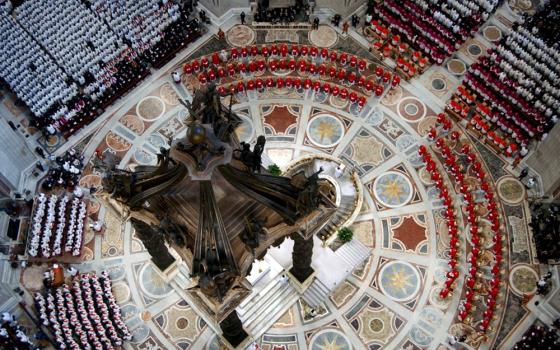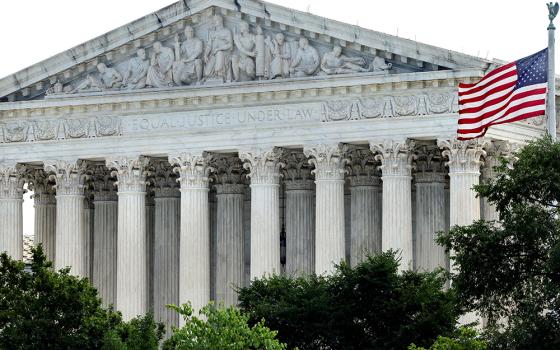Nicholas G. Hahn III has penned a column at RealClearReligion in which he argues that I am a “neo-con.” But, before he does that, he notes that I regularly use the term “neo-con” as an epithet, hurled at those with whom I disagree. His article deserves a reply, but let me first say that I am grateful he chose to accompany his screed with a picture of me with two of my dogs, Bernie & Clementine. They are photogenic, even if I am not.
It is true that I often challenge Catholic neo-cons, but I did not invent the term and do not employ it as a term of derision, only as a term of identification. Neo-cons tend to self-identify as such and always have. I have just finished Michael Novak’s memoir (a review will be forthcoming in the print edition of NCR) and he self-identifies as a neo-con. The term refers to those men and women who were once on the left and became men and women of the right. Richard John Neuhaus was another man of the left who became a champion of the right. I do not know that George Weigel was ever a man of the left, but he, Neuhaus and Novak certainly formed a troika of intellectual influence in the 1980s and 1990s and so I have often lumped them together under the label “neo-con.” To be clear, I do not object to their ideas because they are the ideas of neo-cons. I object to their ideas because they are wrong.
Outside the Catholic world, the most prominent neo-cons tend to be Jewish intellectuals for whom 1967 was not about protesting the War in Vietnam, 1967 was the year of the Six Day War. Prominent neo-cons like Irving Kristol and his wife Gertrude Himmelfarb raised important questions about the use of power in foreign affairs, the primary role of culture instead of mere politics in shaping the course of history, and, most importantly, they delivered a profound and convincing critique of some of the intellectual fads that overtook the American academy in the 1960s and 1970s. For these neo-cons, ideas mattered. For their Catholic counterparts, markets tended to matter more than ideas and that has been the substance of my critique against them.
Needless to say, I stand by all the charges Hahn cites that I have, over the years, laid at the feet of the Catholic neo-cons.
But, not all opponents of neo-conservatism are like all other opponents of neo-conservatism. Growing up in Connecticut, as a young man I was an Ella Grasso Democrat: pro-labor, pro-Israel, pro-life. I am still an Ella Grasso Democrat. My ideas have changed, to be sure, on a range of issues. Certainly, the more I have learned about the rich intellectual traditions of the Catholic Church, I have found myself less persuaded by anything that even has a whiff of faddishness. Alas, those who think they need not be bothered with intellectual history are not liberals, they are merely ignorant. And, I have learned too, the truth of an observation once made by Maritain to the effect that we are born into the world with a liberal heart or a conservative heart and, in any event, there is nothing we can do about that, but that the surest means to intellectual integrity is to pay special attention to the wisdom yielded by those who heart is different from my own. There is much a liberal can learn from reading Burke, just as there is much a conservative can learn from reading Schlesinger. I regularly dine, or at least share martinis, with a friend who is a verifiable, self-identified neo-con, and I always come away smarter from our conversations. Nonetheless, I was then and am now a man of the left in my politics to be sure and, more complicatedly, in my religious sensibilities.
Mr. Hahn seems to think that I am intellectually inconsistent because, on certain foreign policy issues, I end up recommending the same policy ideas as the neo-cons, Catholic and otherwise. I do not know Mr. Hahn, but from his picture he looks like a young man, so perhaps he does not recall the proud history of what was once known as liberal internationalism.
When Woodrow Wilson asked for a declaration of war in 1917, he stated as one of the war aims to make the world “safe for democracy.” I am not a huge fan of our most Calvinistic of presidents, and I wish he had been less grand in his aspirations. The sad history of the twentieth century was to prove that it is beyond the reach of American values or power to make the world safe for democracy. Had Wilson added a single letter, an “r,” he might better have captured what is reasonable to hope for from liberal internationalism, making the world safer for democracy. His fundamental insight, however, that force and law should be joined, remains the only hope of avoiding war and all of its calamities.
The original opponents of liberal internationalism were isolationists. They viewed the troubles of their fellow men and women across the globe and concluded that all that was none of our business. The other challenge to liberal internationalism came from the practitioners of real politique, for whom interests, not values, must govern the affairs of nations. Both opponents continue to exist within the American consciousness and both are as morally objectionable today as they were in the earlier iterations. The isolationists misunderstand the role of America in the world, the need for a robust American presence, as President Obama said the other day at the United Nations: The world has less to fear from American intervention than from American quietude. The real politique school simply misunderstands America and our nation’s deep, and highly moral, sense that might alone does not make right.
The cause of liberal internationalism has been uneven, to be sure, but it is not without its successes. The United Nations, like the League of Nations before it, has not lived up to the hopes of its founders, but it has it uses. NATO was, and is, a more perfect expression of liberal internationalism and, indeed, the high point of liberal internationalism may have been John F. Kennedy’s “I am a Berliner” speech. Certainly, the people of South Korea are grateful for the fact that the United States did not abandon them to their fate. The Helsinki Accords, mocked at the time by many, proved a very useful device for building up civil society behind the Iron Curtain and exposing the lies of the Soviets and their puppets. On the other hand, liberal internationalism took a body blow in Vietnam and, during the Reagan years, America’s willingness to support regimes that were capable of great evil gave interventionism a bad name.
The second Iraq War pointed to the limits of intervention. It is ironic that the neo-cons, so alert to the need for a robust civil society in the West, so critical of liberals who relied solely on an abstract notion of rights to preserve liberty, thought it would be an easy lift to transport the ties of culture and commerce to a country still characterized by tribal and religious ties.
In a conversation yesterday with a friend, he suggested that the term liberal internationalism should be abandoned, correctly noting that the word “internationalism” puts the focus on nation-states that, as often as not, are part of the problem not part of the solution. He suggested, and I accept, the alternate phrase, liberal globalism. As well, the idea that force and law should go hand-in-hand must understand by the word “law” something rooted in morality, not something written on parchment: Mssr. Putin, after all, invoked the norms of international law to suggest an American intervention in Syria would be illegal, while conveniently neglecting the norms of international law against the slaughter of innocents with chemical gases. The Responsibility to Protect (R2P) speaks to the aspiration of Wilson and FDR and Truman and I suspect we would be in a different situation in Syria if President Obama had drawn a red line against the use of air power against civilians, rather than the deployment of chemical weapons. Our fellow men and women on this planet are not pawns in a game of real politique. Their needs cannot be ignored behind a curtain of isolationist exhaustion. The world still needs to aspire to create regimes that are built on liberal principles of freedom of speech, freedom of religion, freedom from want and freedom from fear. If these sentiments sometimes mean I find myself in agreement with Paul Wolfowitz, so be it.
The hopes of liberal globalists today are, I believe, less naïve than once they were. But, the loss of naivete is nothing to mourn. The loss of hope is – precisely – a thing to be mourned. Show me a man who is without hope and I will show you a man who is dead.





